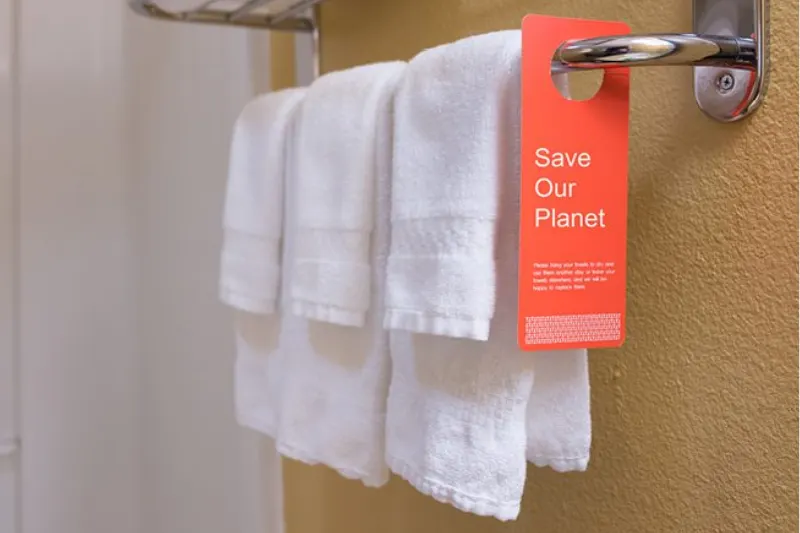Top 10 Hospitality Trends in 2025

Key takeaways
- Digital transformation is accelerating, with AI-driven check-ins and contactless services becoming the norm.
- Staffing challenges are prompting businesses to adopt employee-centric policies and automation.
- Personalized guest experiences are reshaping loyalty programs and service expectations.
- Sustainability is now a competitive differentiator, with service businesses prioritizing eco-friendly initiatives.
- Business and leisure travel are merging, requiring hotels to offer more flexible, long-term stay options.
The hospitality sector is undergoing swift transformations as guest expectations change and technological advancements shift
Hotels, restaurants, and other hospitality businesses are operating in vastly different ways now compared to what they were five years ago, and things are likely to change even more over the next five.
In 2025, staying competitive requires more than excellent service. There is an increasing need to innovate, ramp up efficiency, and focus on employee wellbeing in order to compete for guests.
In this article, we’ll take a closer look at the top 5 hospitality trends for 2025 and how these are impacting business operations.
Hospitality industry outlook for 2025
1. Global market expansion and economic contributions
- The hospitality sector is projected to maintain strong momentum, growing at around 5.8% annually through 2032.
- In 2024, the global hospitality market reached US $4.9 trillion.
- Travel and tourism activities contributed an estimated $11.1 trillion to the global economy in 2024 — roughly 10% of global GDP.
2. Hospitality employment and workforce trends
- The sector currently employs about 330 million people worldwide, and is expected to generate another 126 million jobs by 2032.
3. Lodging sector recovery: RevPAR and occupancy
- CBRE expects U.S. revPAR growth to be around 2%, with urban hotels (2.8%) outperforming suburban (1.3%) and small-town locations (1.8%).
- Marriott anticipates low-single-digit revPAR increases globally, with stronger performance expected in international and luxury segments.
- The group travel segment is seeing renewed strength, with a 6.8% increase in revPAR in the first eight months of 2024, driven by corporate retreats and gatherings.
4. Restaurant and F&B sector growth
- The U.S. restaurant and food service industry is set to bring in $1.5 trillion in revenue in 2025, a 74% increase from 2019’s $864 billion.
- Quick-service restaurants are expected to reach $330.56 billion in market size in 2025.
5. Capital investment and strategic shifts
- Global hotel investment is forecasted to increase by 15%–25% in 2025, driven by decelerating supply growth and clearer debt market conditions.
- Hotels are continuing to diversify — building on pandemic-era innovations like cloud kitchens, long-stay offerings, co-working spaces, and wellness services — transforming them into core revenue lines.
6. Macro pressures
Many hospitality sub-sectors face headwinds: rising labor costs, competition from short-term rentals, and economic volatility remain significant challenges.

5 hospitality trends in 2025 to keep an eye on
The trends in the hospitality industry this year share one thing in common: they’re shaping how guests experience your business — and how you manage it behind the scenes.
These aren’t just hotel trends — they affect restaurants, bars, wellness venues, event operators, and every other corner of the service world.
Below, we break down the five most important hospitality trends in 2025, what’s driving them, and how operators can leverage them to gain an edge.
1. Digital and contactless technology
The modern traveler expects seamless, technology-driven experiences. From mobile check-ins to digital tipping solutions, guests expect convenience at every touchpoint.
The hospitality industry trends of 2025 point to a further shift toward automation, AI-driven services, and mobile-first interactions.

What’s changing in 2025?
- AI and automation everywhere
AI-powered concierge apps, automated order-taking kiosks in fast-casual restaurants, and chatbots for spa bookings are going mainstream. And they’re enhancing efficiency while maintaining a personalized touch. - Contactless payments as standard
Cashless transactions are becoming standard across the hospitality industry, with digital payment options — including cashless tipping apps — allowing guests to show appreciation without the need for physical currency. - Mobile and contactless check-ins
73% of guests prefer self-service check-ins via mobile apps. This change mirrors an increasing preference for frictionless, technology-integrated services that streamline interactions and reduce the need for direct human engagement.
Example: Marriott’s expansion into AI-driven check-ins
Marriott has expanded its AI-powered check-in process across its North American properties, reducing wait times and improving guest satisfaction.
Digital kiosks now allow guests to check in, receive keyless room access, and request services — all without needing to interact with front desk staff.
2. Staff shortages and retention strategies
The hospitality sector continues to struggle with staffing shortages, leading to overworked teams and inconsistent service. Hotel efficiency in 2025 will depend on employee-centric policies, automation, and innovative staffing solutions.
What’s changing in 2025?
- Pay transparency and competitive wages
Operators are openly posting pay rates to attract applicants, offering performance-based bonuses, and investing in more competitive wages.
- Flexibility as a retention tool
Split shifts, seasonal contracts, and gig scheduling apps are helping retain staff who value control over their work hours.
- Automation to reduce strain
AI-driven scheduling, automated payroll systems, and real-time dashboards help optimize labor costs while preventing burnout.
- Well-being programs
Mental health stipends, free meals, and “family meal” culture are becoming part of standard benefits as operators recognize that a motivated and supported workforce leads to better guest experiences.
Example: Hilton’s “Travel With Purpose” initiative
Hilton is addressing retention issues through its “Travel With Purpose” program, which includes tuition assistance, wellness programs, and career development opportunities for employees.
How eTip helps hotels keep up with this trend
With real-time tip tracking, eTip ensures fair, transparent tip distribution, boosting morale and making hospitality roles more financially rewarding.
This is a major factor influencing employee retention, since team members who feel well compensated are more likely to stay in their roles.
3. Personalized guest experiences
Today’s travelers expect more than just a comfortable room or a decent meal. All signs indicate that guests want tailored experiences that cater to their preferences and past behaviors.
Whether it’s remembering a returning diner’s favorite wine, tailoring spa treatments to past preferences, or offering curated tour suggestions, personalization builds emotional connection and repeat business.
What’s changing in 2025?
- AI-driven guest profiles
Hotels, restaurants, and tour operators are using integrated CRM systems to store guest preferences, dietary restrictions, and past purchase history. - Digital concierge services
Digital concierge services are on the rise, with more properties investing in AI-driven platforms that provide tailored recommendations, offering guests more convenience while making their experiences more engaging. - Going beyond loyalty points
Loyalty programs are evolving, moving away from generic rewards in favor of customized perks that align with guest preferences and behaviors.
Example: Four Seasons’ “Chat Concierge”
Four Seasons uses an AI-powered concierge system that remembers guest preferences across stays while also allowing guests to request their favorite amenities or dining options seamlessly via a communications interface.
4. Sustainability and eco-friendly hospitality
Sustainability is no longer an optional perk — it’s a core expectation. Travelers are increasingly booking hotels that demonstrate eco-conscious efforts, and properties that ignore this shift risk losing bookings.

What’s changing in 2025?
- Energy efficiency as ROI
Hotels are taking significant steps toward sustainability by leveraging smart technology to track and reduce their carbon footprint, optimizing energy consumption through automated systems and efficient resource management. - More eco-friendly amenities
Eco-friendly guest amenities are on the rise, as properties phase out single-use plastics in favor of sustainable alternatives. - Paperless operations
Paperless operations are becoming standard, with digital receipts, cashless tipping apps, QR code menus, and online documentation replacing traditional paper-based processes.
Example: Hyatt’s “World of Care” sustainability strategy
Hyatt has committed to reducing single-use plastics across all properties and integrating sustainable sourcing practices. The “World of Care” initiative includes energy-efficient designs and food waste reduction programs.
5. Blurring of business and leisure travel
The line between business and leisure travel is increasingly blurred, with more professionals seeking accommodations that support both work and relaxation.
What’s changing in 2025?
- Work-ready spaces everywhere
From co-working lounges in hotels to café seating with power outlets and high-speed Wi-Fi, “work-friendly” is becoming a selling point across venues. - Flexible check-in and check-out at hotels
Flexible check-in and check-out times are becoming more common, allowing travelers to better balance work and leisure without the constraints of rigid schedules. - Extended stay packages
Resorts, boutique inns, and hotels are offering multi-week rates with F&B credits and access to work-friendly amenities.
Example: CitizenM’s co-working spaces
CitizenM Hotels have transformed their lobby spaces into work-friendly environments, complete with power outlets, communal workspaces, and high-speed internet, catering to the growing bleisure traveler segment.
How eTip helps hotels keep up with this trend
Business travelers often rely on digital transactions. Cashless tipping solutions cater to their need for convenience and efficiency, making tipping an engaging element of their experience.
Fading hospitality trends — what you can skip
Not every idea is worth chasing. Some trends that once made headlines are either losing relevance, delivering poor ROI, or failing to match current guest expectations.
Here’s what’s slipping off the radar for hospitality in 2025:
Overly gimmicky tech without utility
Guests want technology that makes their lives easier — they don’t want novelty for novelty’s sake. Bad tech, like a clunky proprietary booking app, often creates more headaches than guest satisfaction.
According to Skift Research, 71% of guests say they prefer hospitality technology to be “invisible” and integrated into the service flow — not a standalone attraction.
One-size-fits-all loyalty programs
Guests increasingly expect rewards to match their interests. Generic “points for dollars” programs are losing appeal in favor of experiential or personalized rewards.
For example, major hotel chains are shifting away from flat point systems to curated perks (exclusive events, free local tours, premium dining experiences).
Token sustainability gestures
Removing plastic straws alone doesn’t cut it anymore. Guests can spot greenwashing quickly, and sustainability is now expected to be comprehensive.
Booking.com’s 2024 Sustainable Travel Report found that 74% of travelers want to see “transparent and impactful” sustainability efforts before booking.

Stay ahead of hospitality trends
Hospitality industry trends are changing quickly, and they are increasingly pointing to a future where technology, sustainability, and workforce well-being take center stage.
The hospitality industry will always have seasonal swings, shifting guest expectations, and competitive pressure. But if you track these trends and apply them strategically, you’ll stay relevant, keep your team engaged, and deliver experiences guests can’t wait to come back for.
Hospitality trends FAQs
What is the biggest trend in hospitality for 2025?
The shift toward digital transformation is the most significant hospitality trend in 2025, with AI, automation, and contactless services becoming standard in hotels, restaurants, bars, and more.
Why is sustainability important in hospitality?
Sustainability is crucial because guests now prioritize eco-friendly options. Hospitality businesses that focus on energy efficiency, waste reduction, and carbon footprint tracking are more appealing to modern travelers.
How can hotels address staffing shortages?
Hotels are implementing better pay, flexible schedules, and career growth opportunities to retain employees. Automation is also helping reduce workload strain.
How do digital tipping solutions benefit hotels?
Digital tipping ensures transparent, instant tip distribution, improving staff morale, retention, and guest satisfaction.
What are the key hotel review trends for 2025?
Key hotel review trends are focused on service quality, sustainability efforts, and digital convenience. Guests increasingly expect smooth, tech-enabled experiences.
Join the eTip community!
We'll send the latest content & special releases directly to your inbox.
Ready to join the community?
Receive the latest & greatest content from eTip, sent directly to your preferred inbox!
![[CTA] Image - Guest Experience 4 - 1200 x 627](https://no-cache.hubspot.com/cta/default/6775923/interactive-190476979869.png)